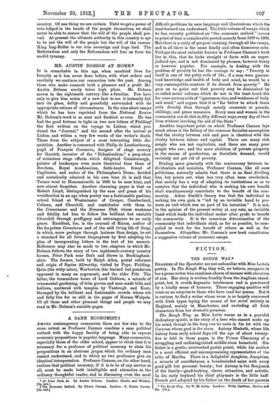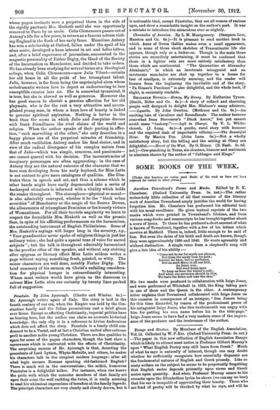FICTION.
THE ROUGH WAY.*
READERS of the Spectator are not unfamiliar with Miss Letts's poetry. In The Rough. Way they will, we believe, recognize in her a prose writer who combines charm of manner with elevation of aim. Her story is written frankly from the Anglican stand- point, but it avoids dogmatic intolerance and is penetrated by a kindly sense of humour. These engaging qualities will come as no surprise to those who have read her poems. But it is curious to find a writer whose verse is so largely concerned with Irish types laying the scenes of her novel entirely in England, mainly in Manchester, and excluding all Irish characters from her dramatis personae.
The Rough Way, as Miss Letts warns us in a graceful dedicatory epistle, is the story of a hero who cannot make up his mind, though in the long run he casts in his lot with the Caravan whose goal is the stare. Antony Hesketh, whose life history from early school days till the age of about twenty- five is told in these pages, is the Prince Charming of a struggling and undistinguished middle-class household. His father is a gentle, overworked parish priest, while his mother is a most efficient and uncompromising representative of the tribe of Martha. There is a delightful daughter, Josephine, a miracle of unselfishness, a broadminded saint with every good gift but personal beauty ; but Antony is the Benjamin of the family—good-looking, clever, attractive, and artistic. In his early boyhood his chief playmate is the little half. French girl, adopted by his father on the death of her parents • The Rough Way. By W. Id, Letts. London: weus Gardner, Barton and Co. [6s.].
whose pagan instincts were a perpetual thorn in the side of the rigidly puritanic Mrs. Hesketh until she was opportunely
removed to Paris by an uncle. Celia Clemenceau passes out of Antony's life for a few years, to return as a famous actress visit- ing England in the flush of her early fame. Meantime Antony has won a scholarship at Oxford, fallen under the spell of his alma mater, developed a keen interest in art and belles lettres, and, after a brief experience of journalism, succumbed to the magnetic personality of Father Digby, the Head of the Society of the Incarnation in Manchester, and decided to take orders. He has already been studying for several terms at a theological college, when Celia Clemenceau—now Julie Vibert—revisits her old home in all the pride of her triumphant talent. Julie, however, is far from being the unprincipled siren whom melodramatic writers love to depict as endeav'ouring to lure susceptible curates into sin. She is somewhat tyrannical, it is true, but she is shrewd as well as generous. Moreover she has good reason to cherish a genuine affection for her old playmate, who is for the rest a very attractive and accom- plished young man, in whom a keen love of beauty is linked to genuine spiritual aspiration. Nothing is better in the book than the scene in which Julie and Josephine discuss with frank friendliness the rival claims of the world and religion. When the author speaks of their parting in affec- tion, "each marvelling at the other," she only describes in a happy phrase one of the perpetual miracles of friendship. After much vacillation Antony makes his final choice, and in view of the radical divergence of his complex nature from that of Julie—which was simple, sensuous, and passionate— one cannot quarrel with his decision. The inconsistencies of imaginary personages are often aggravating : in the case of Antony they are the natural outcome of the character that we have seen developing from his early boyhood, for Miss Letts is not content to give mere catalogues of qualities. She illus- trates them in speech and act, and thus a scheme which in other bands might have easily degenerated into a series of hackneyed situations is informed with a vitality which holds the reader throughout. The atmosphere—physical or moral— is also admirably conveyed, whether it be the "black urban seventies" of Manchester or the magic of the Sussex Downs, the allurements of triumphant Feminism or the homely virtues of Womanliness. For all their terrible angularity we learn to respect the formidable Mrs. Heeketh as well as the prosaic Sam, in spite of his afflicting performances on the harmonium, the outstanding instrument of English Philistinism. Some of Mrs. Hesketh's sayings will linger long in the memory, e.g., Your grandmother never spoke of religious things in just her ordinary voice ; she had quite a special tone of voice for sacred subjects " ; but the talk is throughout admirably harmonized to the peculiar ethos of the speaker, and without any striving after epigram or literary effect Miss Letts seldom writes a page without saying something fresh, pointed, or witty. The minor characters are well done, notably Father Digby. The brief summary of his sermon on Christ's unfailing considera- tion for physical hunger is extraordinarily interesting. Where most writers would have given us the discourse in extenso Miss Letts stirs our curiosity by twenty lines packed full of suggestion.



















































 Previous page
Previous page